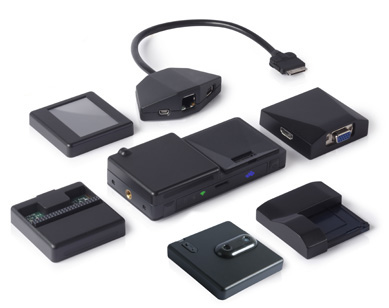Ford’s auto tech will accept open source modules
Sep 12, 2011 — by LinuxDevices Staff — from the LinuxDevices Archive — viewsFord and open source software/hardware provider Bug Labs say they'll collaborate to let developers create modules for the automaker's “Sync” in-vehicle infotainment (IVI) system. The jointly created “OpenXC” research platform will utilize hardware add-ons called “BugBases” and “BugModules,” as well as the cloud-based “BugSwarm” service, according to the companies
Just a few years ago, today's elaborate IVI systems would have been just science fiction. Even more far out, it would seem, is the notion of letting third parties modify such systems via hardware and software add-ons (and frankly, we do wonder about the liability consequences).
But Ford is clearly eager to open up its Sync system, and the automaker used the TechCrunch Disrupt conference in San Francisco Sept. 12 to announce a collaboration with open source provider Bug Labs. The jointly developed Open XC platform "transforms the car into a plug-and-play platform where interchangeable open source hardware and software modules can be quickly and easily customized to perform tasks deemed previously unimaginable by developers," the two companies stated.

The BugBase (center) with a variety of add-on modules
As we review later in this story, Sync is Windows CE-based. On the other hand, Bug Labs' BugBase — shown at the center above along with a variety of BugModules — runs Linux on a Texas Instruments Cortex-A8-based OMAP3530 system-on-chip (SoC) clocked at 600MHz. (For more extensive details, see earlier BugBase coverage.)
Apparently, Ford vehicles will eventually include the BugBase, or something similar to it. With OpenXC, "the car becomes a docking station for Bug Labs interchangeable plug-and-play hardware and software modules programmed with only the connectivity features and services the driver wants," the companies said in their release.

Ford's Fiesta
Meanwhile, a technology demonstration at the TechCrunch Disrupt event is said to have involved a Ford Fiesta (above) demonstration vehicle and employed Bluetooth as the link between Sync and the BugSystem. An LED-equipped module illuminates the car's windshield with a small digital display indicating how fuel efficiently someone is driving, according to Bug Labs.
BugSwarm will keep any gears from being stripped
While the Fiesta could have provided a fuel economy indication on its own, the add-on BugModule is socially networked — making it capable of showing where one's friends are and how economically they might or might not be driving, according to the companies. The connection takes place via the BugSwarm cloud-based service that was also announced Sept. 12.
Via BugSwarm, "M2M and sensor-driven communications are all supported with an extensive library of APIs to support a growing collection of third-party devices," according to Bug Labs. Compatible operating systems are said to include Android, iOS, Mac OS X, Linux, and Windows.
Peter Semmelhack, founder and CEO of Bug Labs, stated:
"BugSwarm solves a huge problem in the marketplace: By allowing developers to access a single web-based service that aggregates and organizes data from potentially thousands of net-connected devices as if it were a unified database, we are significantly reducing the complexity of application development. At the same time, we are accelerating the speed of deployment and providing an opportunity to mashup information from a wide variety of sources to create new, more powerful applications and services."
K. Venkatesh Prasad, a senior technical leader in Ford's Introtronics division, stated, "OpenXC is about creating a platform that is totally accessible to the developer community and quickly incorporates local market needs to offer innovative solutions at an affordable price point. The platform is designed to help us answer the question of how Ford can accelerate the car connectivity experience around the globe, at a value proposition, for both mature and emerging markets."
A new concept car
Ford's IVI announcements this week are not limited to San Francisco, because the automaker's also using the Frankfurt Auto Show to unveil a cloud-connected concept car called the Evos. While no Microsoft involvement with this has been mentioned, the vehicle incorporates innovations that are likely to make their way into future Sync versions, as our sister site WindowsForDevices reported Sept. 2.

Ford's Evos
(Click to enlarge)
The Evos is a plug-in hybrid that includes integral cellular connectivity, capable of connecting the car to both cloud-based computers and a user's office. According to a presentation by Ford Chief Technical Officer Paul Mascarenas, this will allow functionality such as:
- heating or cooling a vehicle before a driver's scheduled departure time
- checking in with the office to find when and where meetings are scheduled
- telling an owner's house to go into power-saving mode as they leave for work
- calling ahead to reserve a parking place featuring an inductive charging pad
- streaming the same music that the driver was just listening to at home
- automatically maintaining a safe distance from the car in front, using both throttle and brake
- and re-routing during a journey in response to traffic conditions
Mascarenas also reportedly said the Evos will include a non-intrusive heart rate monitor that detects the level of stress on a driver. If he or she seems overly excited, the car can block phone calls and messages, limit its displays to providing only essential functions, and even tailor musical selections accordingly.
(For more background on the Evos, Ford's Sync platform, and Microsoft's automotive technology, see WindowsForDevices' recent Evos coverage.)
Ford's Evos
Source: Ford
(click to play)
Further information
Ford and Bug Labs did not release a timetable for inclusion of the BugBase in vehicles. Meanwhile, BugSwarm is currently in invitation-only testing but will open to a general developer preview in October, according to Bug Labs. Pricing and availability for the general public will be announced during the fourth quarter, the company adds.
Jonathan Angel can be reached at [email protected] and followed at www.twitter.com/gadgetsense.
This article was originally published on LinuxDevices.com and has been donated to the open source community by QuinStreet Inc. Please visit LinuxToday.com for up-to-date news and articles about Linux and open source.